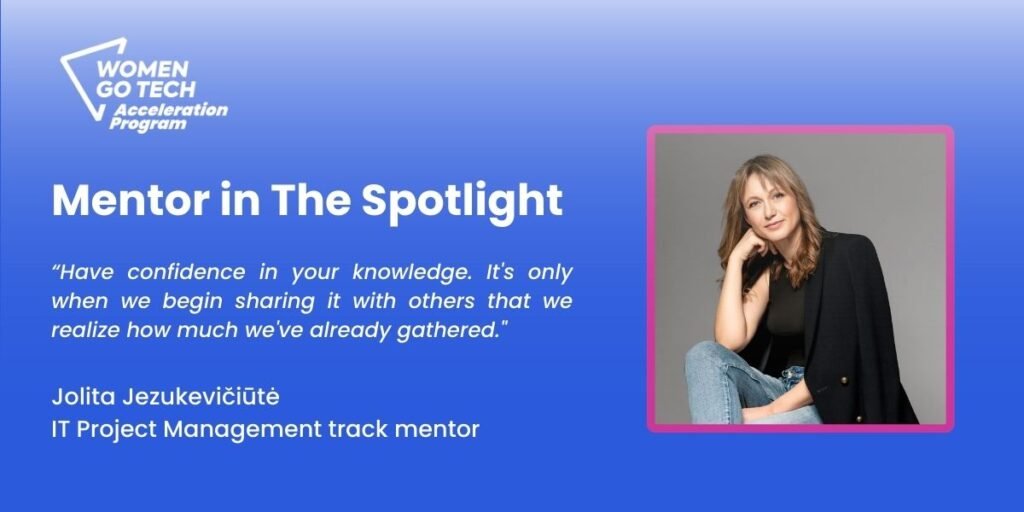|
Getting your Trinity Audio player ready…
|
Jolita Jezukevičiūtė, Chapter Lead (Tech. Product Owner) at Danske Bank, Women Go Tech ambassador and a mentor in the IT Project Management track is making a significant impact in the tech industry. Beyond her professional achievements, she is deeply committed to mentoring and empowering others. We’re talking to Jolita about her journey as a mentor and the valuable lessons and rewarding experiences she has encountering along the way.

What drove you to become a mentor?
To be honest, I started looking for what would truly inspire me, and mentorship has always meant a lot to me. I was a mentor in previous companies and later in a UK IT program. It was natural for me to continue mentoring because it offers a chance to make someone’s life easier by guiding them into IT. Helping even one person is a huge achievement + you improve yourself along the way.
Last year, I saw on LinkedIn that Women Go Tech was looking for mentors for the Acceleration program, which also supported Ukrainian women. This attracted me even more, so I immediately applied. I love how this community grows with our mentees and constantly improves by seeking feedback. That’s how real trust is built, in my opinion.
What are the top three things you learned from mentoring?
Based on my WGT mentoring experience, I can highlight three key aspects:
- Listening: Mentoring has taught me to truly listen and understand my mentees. Our sessions are focused on them, creating an open and supportive environment where they can shine. During our sessions with mentees, I mostly listen to them and only interject when they have a question or if it is necessary to introduce a new topic. Also, our feedback sessions are actually pretty awesome!
- Quality: The importance of dedicating quality time to each mentee is critical. Last year, I had three mentees, but this year I limited myself to one to ensure I could provide the best support. It’s not about taking on as many mentees as possible, it’s about taking on as many as you can give quality time to. Rushing through meetings doesn’t do anyone any favors.
- Self-motivation: Sometimes, things don’t go as planned. I had a mentee who disappeared at the start of the program. It was disappointing, but I learned that you can’t force someone to be motivated. I reached out a couple of times, but when there was no response, I let it go. It’s important to understand that no one else is responsible for our happiness, motivation, and professional growth. We are responsible for that, and we can’t do the work for our mentees.
What surprised you most, and what was your favorite mentorship moment?
We’re all so different, and that’s what makes mentoring special. One size definitely doesn’t fit all. I thought it would be beneficial to start a project from scratch, combining theory with practice to make it more real-world.
The concept remained the same, but its implementation was very different. For instance, with one mentee, we focused only on theoretical discussions using tools like Miro, while with another, we jumped straight into hands-on practice by using Jira, User story mapping, and Roadmap.
Life has a funny way of surprising you, doesn’t it? It’s also a rewarding feeling to see your mentee progressing. It easily became my favorite part of mentoring.
What advice would you give to new mentors, and is there a mentorship myth you’d like to dispel?
Have confidence in your knowledge. It’s only when we begin sharing it with others that we realize how much we’ve already gathered. While some believe that mentorship is all about the mentor sharing knowledge with the mentee, it’s actually more like a fun exchange where both sides learn and grow together. It’s all about creating a cozy vibe and making teamwork feel as easy as a breeze.
Can you share a mentee success story, and how did it make you feel seeing that success?
Transitioning to a career isn’t easy. Saying goodbye to the past while building the way for a bright future can be tough. That transitional phase simply requires patience, learning, and faith in one’s choices.
I was pleasantly impressed by one of my mentee’s proactivity. She actively contributed by suggesting tasks and engaging in discussions on topics that interested her. I’m incredibly proud of the progress she made during the program. Prior to the program, she was unemployed. After completing it, she found a job at an IT company in Kyiv, Ukraine. Despite the challenging circumstances in the region, her hard work and proactive attitude truly paid off. It’s so inspiring!
